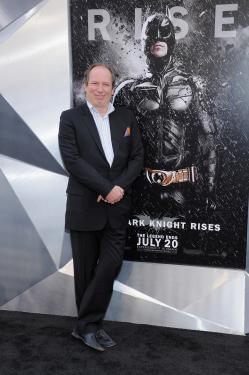It’s no surprise Christopher Nolan’s epic conclusion to his Batman trilogy dominated the box office last week; despite the terrible violence in Colorado on Friday, The Dark Knight Rises managed to bag an impressive $161 million in its first weekend. But the movie’s success wasn’t limited to its box office returns: The Dark Knight Rises score, written by prolific Hollywood composer Hans Zimmer, has been achieving its own milestones.
According to Nielsen SoundScan, the score joined the likes of Nas and the Zac Brown Band on the Billboard 200 chart this week, in the No. 8 position with 33,000 copies sold. While it’s not wildly uncommon for a film score to enjoy a life beyond the screen, these stand-alone types usually comprise a selection of pop tracks from well-known bands. (Think of the Forrest Gump soundtrack, for example, which topped out at #2 on the same chart in 1994.) Original orchestral soundtracks, meanwhile, are generally relegated to film music fan collections and the repertoires of high-school marching bands. Even the most recent instrumental soundtrack to enjoy this kind of chart success—Daft Punk’s Tron: Legacy—benefited from the pop credentials of its composers and their signature pulsing, electronic dance music flavor.
But it seems that Zimmer’s far less palatable Gotham soundscape may be transcending its celluloid roots, a feat made more remarkable by the fact that film critics, on the whole, hated it. Slate’s own Dana Stevens, for example, bemoaned the music’s “maddeningly unrelenting percussive” quality, while The Chicago Tribune’s Michael Phillips articulated the critical consensus when he called it “Zimmer’s shut-up-already musical score” (emphasis mine).
Fans may be agreeing with Phillips, however indirectly, when they pay for the ability to revisit those emotions apart from the movie, on their iPods. For some the score may work equally well—or perhaps even better—on its own.
If this is the case, then Zimmer may have achieved his own rather radical goal in the world of film scoring. Movie music has traditionally been tasked with modestly supporting the action on screen, enhancing the mood and often providing an emotional or psychological dimension that acting cannot communicate (much of this was explored in a recent Slate Culture Gabfest). Zimmer’s goal, on the other hand, is to have his musical creations transcend the realm of passive “underscoring” to stand as works of art on their own, no screen required.
That’s the stated purpose of a new iPhone app that Zimmer, in partnership with developers RjDj, released last Thursday. When a user activates The Dark Knight Rises Z+, she is transported to the world of Gotham via her headphones. Recognizable elements of Zimmer’s scoring—repeated ostinato patterns in the strings, metallic percussion—provide a sonic backdrop while the app records sounds from the world around you (via your device’s microphone), transforming and layering them into the music. The app also senses whether you’re sitting still or walking and adjusts the energy level of the music accordingly.
When I tried out the app at the office, it transformed the clacking of my keyboard into startling footsteps, and later, when I walked to the subway, the clang of a nearby manhole cover instantly morphed into the distinctive mixed meter groove of “Gotham’s Reckoning.” Discordant bell clangs (courtesy of a car horn) soon joined the mix, and a sunny New York day seemed to darken with anxiety and dread—Zimmer had successfully Gothamized my evening commute.
When critics complain about The Dark Knight Rises’ score in their reviews of the film, they are judging it according to the traditional criterion of how it contributes (or works against) the movie. But Zimmer has created his own aesthetic universe that merits independent consideration. We can debate whether his model is a desirable one for film music in general (probably not). But perhaps in cases like this one, where the soundtrack is so clearly an aesthetic object in its own right, we should allow that film and scoring can be equals—or, depending on your taste, reverse their roles entirely.
You can stream the entirety of Zimmer’s score here.
